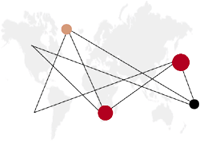
| RESOURCES | |
|
This summary was prepared by Jamil Salmi. 9/15/2000 Three events were recently organized in Colombia around
the launching of the Report of the Higher Education Task Force under
the joint sponsorship of the Colombian Association of Universities
(ASCUN) and the World Bank office in Colombia: (i) a closed meeting with senior Government officials and rectors of public and private universities in Bogotá, (ii) an open meeting with university professors and administrators at ASCUN's headquarters in Bogotá, and (iii) a meeting with regional universities in Medellín (Department of Antioquia). The principal Launch meeting in Bogotá, which lasted a day and half, brought together about 20 rectors and vice-rectors of the most important public and private universities in the country, the Heads of the Higher Education Council (ICFES), the Higher Education Investment Fund (FODESEP), the Latin American Association of Student Loan Agencies (APICE), as well as representatives of the Planning and Education Ministries. Jamil Salmi, coordinator of the World Bank's tertiary education thematic group, made a presentation focusing on the impact of globalization and the information / communication revolution on tertiary education in developing countries and introduced the work of the Task Force in terms of background, composition and process. José-Joaquin Brunner, a Chilean member of the Task Force, made a very stimulating presentation of the main conclusions of the Report. Santiago Malo, a reknown higher education researcher from Mexico, served as discussant. After these initial presentations, the participants worked in small groups the rest of the day to discuss the content of the Task Force Report and assess its relevance to the Colombian higher education situation. During the last half-day of the meeting on the second day of the meeting, each group presented its conclusions and engaged in a constructive debate, with Professor Brunner, Professor Malo and Jamil Salmi on the applicability of the Task Force recommendations in the Colombian context. An interesting dimension of the debate on the Colombian case was the observation that many reform proposals had been under consideration in the past few years, but that in the absence of a clear consensus and strong political will, these proposals had not been translated into concrete decisions and measures. The closed meeting was followed by an open meeting with representatives of the teaching and administrative staff of public and private universities members of ASCUN. José-Joaquin Brunner and Jamil Salmi presented the Task Force Report. In Medellin, the rectors of most public and private universities in the Department of Antioquia attended a one-day workshop on the Future of Higher Education where Jamil Salmi made a presentation, based on the Task Force Report, on the new challenges faced by higher education and their implications for Colombian universities. The Task Force Report received an overwhelmingly positive reception. Participants praised the breadth of themes and the non prescriptive tone of the Report. Among the sections of the Report which were considered most useful and challenging were the discussion of higher education as a public good, the recommendations about the importance of general education, issues of governance, the part about the need for institutional diversification and the treatment of science and technology issues. Participants remarked that this Report would contribute in a significant way to changing the negative perception, in many countries and especially in public universities, of the World Bank as an international agency against investment in higher education. ASCUN is planning a series of meetings with the higher education community, political leaders, members of Congress, employers and the medias to disseminate the messages of the Report. Prior to the Bogotá meeetings, a Spanish translation
of the Task Force Report had been prepared by ASCUN and distributed
to all participants. ASCUN has kindly given the Task Force and the
Bank permission to reproduce and use the Spanish version of the
Report for dissemination in other Latin American countries. ASCUN
is also planning to put the Spanish translation on its website. |